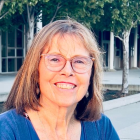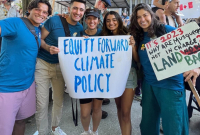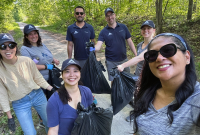Support strong Canadian climate journalism for 2025
These in-their-own-words pieces are told to Patricia Lane and co-edited with input from the interviewee for the purpose of brevity.
Divya Dey is connecting Black, Indigenous, and women of colour to nature. In August 2024, this 24-year-old, passionate, intersectional environmentalist took 15 young women camping in Quebec. Most had no previous experience living in nature. After spending the weekend canoeing, hiking, learning archery, visiting a farm, telling stories around a fire and attending workshops, participants learned they could find themselves and community in the outdoors.
Tell us about this project.
“BIWOC in the Outdoors” participants, most of whom did not know each other, spent three days and nights together far from the city in a group campsite. Swimming and canoeing gave them water experiences. Rock climbing invited them to take to the air. Hiking, archery and visiting a farm brought them closer to the land. Storytelling, mutual appreciation and board games facilitated community building. Opportunities for reflection invited an exploration of a deeper sense of self. Playing a card game, Your climate future is in the cards, invited a big picture lens.
Being with other young women of colour helped create a safe space for engagement. Participants told us they were proud of themselves and each other for their bravery in doing new things, and developed a deeper appreciation for the importance of diversity, equity and inclusion policies.
How did you get into this work?
At 14, I became a swim coach, and this, together with my other sports, became an anchor for my well-being. At the University of Toronto (Scarborough), I led outdoor trips, witnessing their impact on students’ health. However, I struggled to align my passion for recreation with my identity as a South Asian environmentalist. In March 2024, the life-changing Starfish Canada’s Youth Environmental Changemakers Summit helped me see that recreation could support my career goal of connecting international development with climate action
Why was it important to focus on women of colour?
First, many of us come from newcomer families who must often make tough financial decisions. It is expensive to leave the city to experience nature. And if we do go camping, we are a tiny minority. We may feel we are missing out on something our communities are doing at the same time. Second, seeing ourselves as belonging in the outdoors is new for many. Most outdoor spaces and experiences tend to be predominantly white, and it is hard to relate to their experiences. We know there are multiple health benefits from spending time in nature, yet we continuously miss out on this source of healing because we do not feel fully ourselves in these outdoor spaces. Finally, the world needs these women engaged in efforts to protect the climate. We have to allow them to see themselves as benefitting from preserving our environment.
What makes this hard?
Safety is rightly a top concern. All the activities have an element of both physical and mental health risk. Is the first aid kit properly stocked? Do I and others know how to use it? Have dietary and sleeping accommodations been made? Where is the nearest hospital and what is the plan to get there in an emergency? Will participants feel cared for and respected at all times?
What brings you hope?
I have led other camps with people already comfortable being outdoors. This one was particularly moving, because for so many like me, the natural world is alien. Participants left feeling much more comfortable on and in the water and being closer to the land than they normally do in cities. They said they were more likely to be outdoors, felt connected to nature and were more knowledgeable on sustainability issues and solutions, as a result of their experiences. We will protect what we know and love. If you create small ripples, they might create waves of change. Having these voices at the table will enrich action on climate.

How did the way you were raised affect where you are today?
My parents always supported me, with my dad's rural Bangladeshi roots fostering my connection to the land. They exposed me to endless possibilities, cheering me on while offering valuable advice to help me achieve my goals.
What do you see if we get this right?
Climate change is having disproportionate impacts. Those who do the least to cause it and have the fewest resources to contend with the impacts are having the worst time. I look forward to a world where hearing about the next wildfire or flood does not necessarily mean misery for anyone. I look forward to a world that is in perfect balance.
What would you like to say to other young people?
You can do it! Young people are already having an impact. It can feel scary to try to broaden your scope outside your family or your school, but it can be done.
What about older readers?
Your guidance and mentorship mean we can learn, grow and lead.
Divya Dey will obtain her Master's of Science in Sustainability Management from the University of Toronto in 2025.







Comments